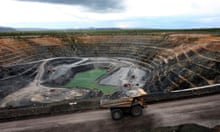Two London-listed mining groups are to slash up to 12,000 jobs as commodity prices slump to levels last seen during the global recession of 2008-09.
Platinum producer Lonmin plans to shut or mothball several mine shafts, putting 6,000 South African jobs at risk. Platinum prices have hit a six-and-a-half-year low, while power and labour costs in South Africa have increased sharply.
Anglo American is also cutting 6,000 jobs and stepping up a cost-cutting programme, after slumping to a first-half loss due to the rout in metal prices.
Rising worries about oversupply, coupled with demand tailing off in China – the largest commodities consumer, have battered metals prices over the past week. Platinum has fallen to less than $1,000 (£645) an ounce – having been nearly $2,000 in 2011 – while copper has reached 2009 lows.
Gold hit fresh five-and-a-half-year lows of $1,077.00 on Friday, extending sharp losses from the start of the week when investors dumped the precious metal on expectations that US interest rates will soon rise. Gold has long been viewed as a safe investment during times of uncertainty, but when interest rates rise investors typically switch out of non-yielding gold into other assets that pay interest or a dividend.
Mark Cutifani, Anglo’s chief executive, said the FTSE 100 company has been cutting platinum, diamond and coal production. He said the market for iron ore, the main ingredient in steel, is clearly oversupplied, with industrial production in China slowing.
“It is a tough market, prices are falling away, but we expect to show progress by the end of the year. It will probably get tougher in the second half, but we will get through it,” he told Bloomberg TV.
Lonmin shares slumped 17% to a record low of 62.4p, while Anglo American shares lost 3.5% to 778p, the lowest for almost 13 years.
Much of the pressure on commodities has stemmed from signs of a slowdown in China, the world’s second biggest economy. Fears of waning Chinese demand were raised on Friday by figures showing activity across its factories declined in July at the fastest pace for more than a year . The flash Caixin/Markit China Purchasing Managers’ Index dropped to 48.2 in July. It marked the fifth month in a row that activity has been below the 50-point mark that divides contraction from expansion.
At the same time, supply of many commodities, particularly industrial metals and oil, has picked up, further knocking prices.
Chris Weston, chief market strategist at spreadbetter IG Group, also pointed to expectations that the Federal Reserve could raise interest rates as soon as September.
“The issue of falling commodities has replaced Greece and Chinese equity volatility as the centrepiece of the capital markets. This seems to be premised on a toxic mix of increasing future surplus figures, but Chinese growth and concern of a September move from the Federal Reserve are also in play,” he said.
Despite the recent sharp price moves, not all analysts believe the outlook is gloomy for commodities. Consultancy Capital Economics said it disagreed with those “scrambling to predict a further collapse”.
“Our view is that the pendulum has already swung too far towards pessimism, particularly over the prospects for ... demand. Indeed, in many cases the recent falls in prices may actually help to accelerate the responses – both in demand and supply – that are necessary for a sustained recovery in 2016 and beyond,” said its head of commodities research, Julian Jessop.
Mining firm Lonmin pointed to depressed platinum prices as it revealed its planned closures could affect up to 6,000 employees, including contractors.
The National Union of Mineworkers (NUM) described Lonmin’s planned job cuts as a “bloodbath”.
“It is a tragedy for the mineworkers in South Africa. As the NUM, we are going to fight against any job losses,” it said in a statement.
“This drastic action by Lonmin will leave thousands of mineworkers in a dire situation. The high number of retrenchments will contribute to high unemployment rate in South Africa.”
The unemployment rate in South Africa is more than 25% and there have been bloody clashes with Lonmin workers.
Anglo also blamed the “commodity price rout” as it reported a loss of $1.9bn (£1.2bn) for the six months to June, against a profit of $2.9bn a year earlier, partly reflecting asset writedowns.
The first of the big global miners to report results for the six months to June, Anglo is looking to slash 6,000 “overhead and other indirect roles” out of a total workforce of 151,200 worldwide, a 35% reduction. It is also cutting back at its London office. The group has been selling off assets in its battle to restore profitability and intends to reduce the number of assets from 55 to 40.





Comments (…)
Sign in or create your Guardian account to join the discussion